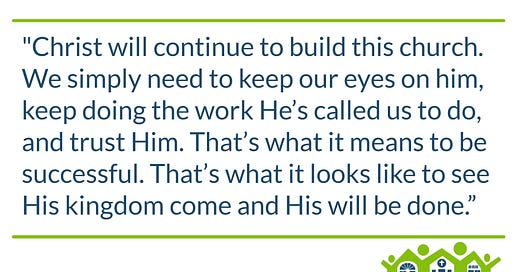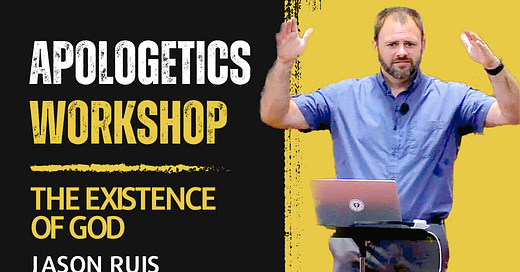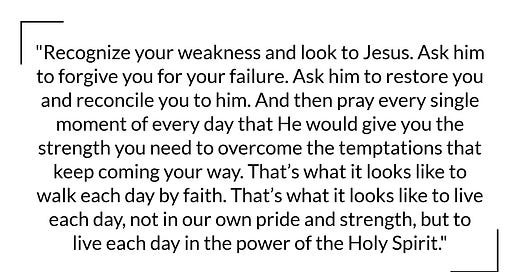
Sound in the Faith
[Read Titus 1:10-16]
If you were going to plant a church, what types of communities would you look at? Would you look for a well-to-do neighborhood where things go fairly smoothly? Would you look for a wealthy neighborhood that is growing? Or, would you look for the most difficult neighborhood around—one full of evil people with hard hearts?
At the core of this question, lies our understanding of the success of a church. What if a church is planted in an evil neighborhood, diligently working to preach the gospel and see hearts changed, yet remains a small church? Is that church successful? What if a church is planted in a well-to-do neighborhood, has a solid budget, grows in number every year, but hearts are not really being changed? Is that church successful?
The question comes down to this: Are we seeking to see sick people healed? Or, are we hoping to attract healthy people? When you are seeking to see sick people healed, it’s hard, demanding work. Things get messy. Problems come up. Budgets don’t always work. Numbers don’t always increase. Yet, Jesus said he didn’t come for the healthy, but to heal the sick.
Look at the description of the island of Crete. Paul writes, “Even one of their own prophets has said, “Cretans are always liars, evil brutes, lazy gluttons.” This testimony is true.” (Titus 1:12–13, NIV). So, one of their own people describes them this way: full of liars, full of evil brutes, full of lazy gluttons. Other writers during that time have similar things to say. One says, “So much in fact do sordid love of gain and lust for wealth prevail among them that the Cretans are the only people in the world in whose eyes no gain is disgraceful.” (Polybius). Another says, “Moral principles are so divergent that the Cretans…consider highway robbery honorable.” (Cicero). This is a city filled with difficult, messed up people, so they planted a church there to do some gospel work.
Not only are their lives a mess—full of moral decay and disorder—but their doctrine is also a mess. Just like we talked about last week, Life and Doctrine are always interconnected. So, their lives are characterized by being evil brutes and their doctrine is characterized by this: “For there are many rebellious people, mere talkers and deceivers, especially those of the circumcision group…they are ruining whole households by teaching things they ought not to teach—and that for the sake of dishonest gain.” (Titus 1:10–11, NIV). So, they are empty talkers, saying things that sound profound and deep but have no meaning. They are deceivers, intentionally lying and leading people astray. They are teaching things that should not be taught and doing it so that they earn some extra money or prestige. And, because they are doing these things, whole households are suffering and coming to ruin. Once again we see that Life and Doctrine are connected. Their false teaching is bringing households into ruin—ruining lives. So, they plant a church here to do some gospel work.
Does any of this sound familiar to you? I understand that it’s difficult to make comparisons between ancient cities and modern cities, but it’s fairly easy to see that we are not living in a culture that honors purity of life or doctrine. If we decided not to be politically correct, we could most likely look around our city, state, and nation and see many people that could be characterized as liars, evil brutes, lazy gluttons, empty talkers, deceivers, teaching things they should not teach, teaching in order to gain money or prestige. Not only are these people in our country, they are also in our state and in the city of Beaver Dam. So, what do we do? Sixty years ago we planted a church here to do some gospel work, and we keep working in the midst of difficult people doing a gospel work.
So, what is our strategy when ministering to difficult people in a difficult culture? To answer the question, it’s important to notice the very first word in this passage: “For…” (Titus 1:10, NIV). That word tells us that this passage is going to build upon what has already been said. That means that all of last weeks teaching about elders is connected to ministry with difficult people. The reason you need elders whose life and doctrine are in order, is because they are ministering to a difficult population whose life and doctrine are way out of order. So, the first strategy when ministering to a difficult population is to have the right leaders—leaders whose life and doctrine are in order.
Yet, there’s more to these leaders. Not only do they need to have their life and doctrine in order, but they need to be able to correct and rebuke those whose lives and doctrine are out of order. So, at the beginning of this passage, after talking about the false teachers, it says, “They must be silenced…” (Titus 1:11, NIV). Then, later on in the passage, after speaking out their immoral lives, it says, “This testimony is true. Therefore, rebuke them sharply, so that they will be sound in the faith” (Titus 1:13, NIV). So, a strategy for ministering to difficult people is to have leaders whose lives and doctrine are in order and are willing to silence false teachers and sharply rebuke those who are going astray. That’s the strategy.
Now, we really don’t like this, do we? Does it make you cringe a little bit when Paul says that an elder needs to SILENCE false teachers? How about when he says that the elders need to rebuke them SHARPLY? In this instance, he’s not even qualifying it by saying gently. He’s specifically telling the elders to rebuke these people sharply—there should be a pointedness to their rebuke. It may even hurt a little bit.
I heard a funny story the other day—I’m not sure if it’s true—but it makes a good point nonetheless. There was a small methodist country church down south that was looking for a new preacher. As they spoke to their bishop, they only had one requirement: he had to be hellfire and brimstone preacher. So, the bishop searched around, found one, and placed him in the church. Yet, after a month or so, the pastor was gone. The church asked the bishop to find them another one, so he did. Yet, after another couple months that pastor was also gone. They asked the bishop another time to find them a hellfire and brimstone preacher. So, reluctantly, he searched and found another one to place in their church. This time, it went really well and stayed there for a number of years. After a few years, the bishop ran into one of the congregation members and asked them about the difference. Why had this pastor lasted so much longer than the other hellfire and brimstone preachers. The congregation member said, “This preacher doesn’t sound like he wants us to go there.”
I think this principle applies to church discipline as well. There has been a season in the life of the church where discipline was enacted upon members and they felt like the church was enjoying it. It was like a preacher preaching hellfire and sounding like he wanted them to go there. So, as a result, we now have a generation of churches who basically refuse to do any form of church discipline. Rightfully, they don’t want to be that way. They don’t want people to “pay” for their sins because Jesus has already paid for their sins. However, church discipline is a necessary aspect of church ministry and the life of a Christian. It’s actually a strategy for doing ministry with difficult people in difficult neighborhoods—our neighborhood.
It talks about discipline in Hebrews saying, “If you are not disciplined (and everyone undergoes discipline), then you are illegitimate children and not true sons. Moreover, we have all had human fathers who disciplined us and we respected them for it. How much more should we submit to the Father of our spirits and live! Our fathers disciplined us for a little while as they thought best; but God disciplines us for our good, that we may share in his holiness. No discipline seems pleasant at the time, but painful. Later on, however, it produces a harvest of righteousness and peace for those who have been trained by it.” (Hebrews 12:8–11, NIV). Church discipline, when done rightly, produces a harvest of righteousness and peace. When done rightly, church discipline leads us away from sin and toward Jesus Christ. If we are not doing church discipline, we are saying that people are “illegitimate children” and unloved. If we truly love people, and want to see them become more like Jesus Christ, living in righteousness and peace, we will discipline them.
Yet, we all know there’s a difference between angry, vindictive discipline and loving, restorative discipline. The tone and actions are different. In order for discipline to be done rightly, it needs to be done out of love, not anger. It also needs to be done in a restorative way. Paul says, “Therefore, rebuke them sharply, so that they will be sound in the faith” (Titus 1:13, NIV). The “so that” points to purpose. If we ever find ourselves rebuking someone sharply, the purpose MUST be to see them living sound in the faith. We do no rebuke someone sharply simply because we want to hurt them or cause them to feel pain or to make them “pay for what they did.” That’s completely unChristian in every way. If we must rebuke someone sharply, we are only doing it so that they would be sound in the faith—becoming more like Jesus Christ. That must always be our goal whenever we do church discipline.
I make the idea of church discipline a big deal because it is a big deal. The Belgic Confession—one of our church’s confessions—says, “The true church can be recognized if it has the following marks: The church engages in the pure preaching of the gospel; it makes use of the pure administration of the sacraments as Christ instituted them; it practices church discipline
for correcting faults. In short, it governs itself according to the pure Word of God, rejecting all things contrary to it and holding Jesus Christ as the only Head.” (Article 29). If we want to have a healthy church, one that is growing closer and closer to Jesus Christ, church discipline must be done AND it must be done well—out of love, with a desire to see people restored and more like Christ.
It’s even more important that we do this while ministering in a difficult culture—even a culture that dislikes and despises all forms of discipline. It’s also important for us to make sure our own hearts are in a place to receive discipline if it comes our way. Remember, discipline is never pleasant while it is happening, but when trained by it, it produces a harvest of righteousness and peace in your life—you become more like Jesus Christ.
When having conversations like this, we can become overwhelmed, worried about how people will respond, worried if this will scare people away, worried whether we will actually begin to see fruit in such a difficult cultural field. How can we do ministry when we’re surrounded by liars, evil beasts, lazy gluttons, empty talkers, deceivers, and false teachers? As that questions rolled through my head this week, I was reminded that Jesus said, “I will build my church, and the gates of hell shall not prevail against it.” (Matthew 16:18–19, ESV). It’s not up to us to build the church, Christ will build his church. We are called to be faithful and keep our eyes on him. We are called to do the work he has called us to do and trust him. He WILL build his church and nothing will stand against it. In the midst of the evil island of Crete, there stood a church doing gospel work among difficult people. Here, for sixty years, stands a church, in the midst of Beaver Dam, doing gospel work among difficult people. Christ will continue to build this church. We simply need to keep our eyes on him, keep doing the work He’s called us to do, and trust Him. That’s what it means to be successful. That’s what it looks like to see His kingdom come and His will be done.









